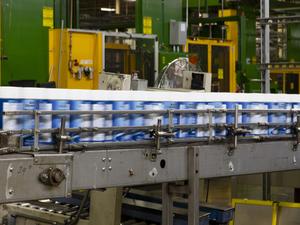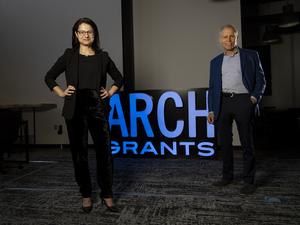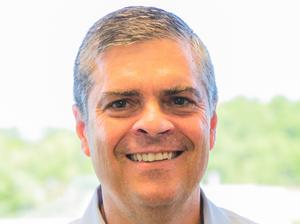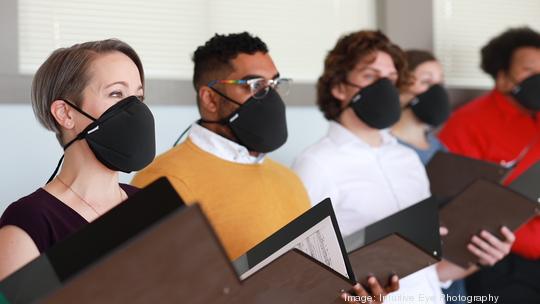
When Stephanie Tennill, assistant professor of music at Saint Louis University, began to conceptualize a face mask to help singers more easily perform during the Covid-19 pandemic, it was simply an idea to solve a personal need.
“Initially my teaching and students were the inspiration for coming up with a mask that could provide comfort, clarity and stability while teaching and singing,” Tennill said.
The professor never envisioned her project would create a startup company. Today, Tennill is founder and CEO of VocalEase, a company that sells a face mask designed for singers and speakers and that has taken a social impact approach with its business model.
While Tennill’s original idea focused on helping her students, the face mask she created now can be found beyond SLU’s Midtown campus. VocalEase’s product is used by choral organization Oratorio Society of New York, which holds concerts at the famed Carnegie Hall, and by professional singers such as Kyle Barisich, who performed in Broadway's "The Phantom of the Opera."
Tennill began tinkering with her face mask idea in 2020 from her home’s kitchen table, pulling together materials she thought could create a mask that would stay in place amid the large jaw movements that come with singing. She also envisioned a mask that would provide greater vocal clarity to reduce muffled sounds and minimize vocal strain on singers and speakers.
In designing VocalEase’s mask, Tennill worked with SLU’s Andy Hall, a biomedical engineer who runs the university’s Center for Additive Manufacturing, to test different materials for filtration and sound clarity. She also teamed up with professional costume designer Noelle Wagner on the product’s development.
VocalEase’s face mask uses reticulated polyurethane filter foam as its main material. Tennill said the foam, which also is used in microphone windscreens, allows VocalEase’s mask to provide both breathability and vocal clarity. The masks also include nylon/spandex fabric that Tennill says provides both a strong fit and flexibility while singing and speaking. VocalEase sells its mask for $39.95.
In forming a startup to sell the face masks, Tennill said she worked with SLU social entrepreneur in residence Barry Maciak to create a company with a mission that extends behind sales and profit.
“I wasn’t doing this in order to start a business and make money. I just wanted to do this to help people,” Tennill said.
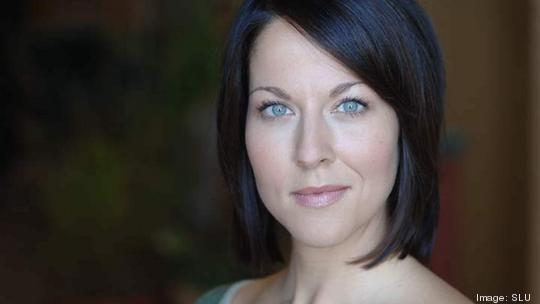
VocalEase’s masks are manufactured by The Collective Thread, a St. Louis nonprofit that trains vulnerable women for sewing jobs and provides them with employment. JSI, a sheltered workshop that employs developmentally disabled adults, packages the product. Additionally, a portion of VocalEase’s proceeds goes to New York-based nonprofit Sing for Hope.
While Tennill didn’t provide specific sales figures, she said VocalEase so far has sold several thousands of its masks since sales began in August. She said the mask is used by professional choirs and performers, local singing groups and educational institutions.
While VocalEase plans to continue operations as long as face masks are in demand, Tennill said she believes there’s opportunities beyond the pandemic. She noted that professional singers and speakers could end up using VocalEase's product long term to avoid illnesses that could impact their voice.
“For those who do rely on their voice for their income and their professional life, getting sick or losing your voice can sabotage an entire audition season,” she said.
Tennill and her husband, David Brandsteder, personally financed VocalEase’s startup costs, which she declined to disclose. The professor also received a $1,000 research grant from SLU to advance the project.
Reflecting back on VocalEase’s creation, Tennill said the development of her kitchen table idea into a startup company highlights a collaborative approach that has defined her endeavor.
“I know nothing about manufacturing. I know nothing about being an entrepreneur or about sewing or starting a business," she said. "I learned that all along the way by reaching out and the community in so many different aspects came together to help bring this to life."
